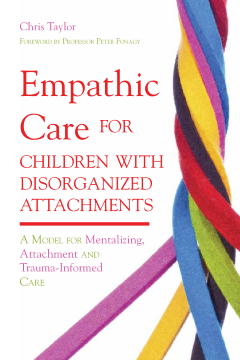
Additional Information
Book Details
Abstract
Disorganized attachment is the most extreme form of insecure attachment. This book is a practical guide to caring for children and young people with disorganized attachment and related emotional and psychological difficulties.
Synthesising attachment, trauma and mentalization theory into a useful practice model, Empathic Care for Children with Disorganized Attachments proposes ways of meeting the needs arising in children and young people with disorganized attachments. Focusing on the importance of interpersonal bonds to facilitate the child's capacity to mentalize, it aims to equip the reader with the appropriate skills to provide effective, sustained and, most importantly, empathic care to the most vulnerable and troubled children. This structured psychotherapeutic approach to caregiving will enable the development of child–carer relationships and can be used to create informed, safe environments that support both the young person and the caregiver.
This useful guide will be invaluable to health and social care professionals including residential carers, therapists, counsellors, and those working with vulnerable and troubled children and young people including those supporting foster and adoptive families.
I warmly recommend this book to anyone working with or caring for traumatised children... Providing helpful introductions to attachment theory and recent developments in neuroscience, the book is written in a clear, accessible style... The book manages to combine theory and research while providing practical advice on how to work with traumatised children. The tone of the book is compassionate and understanding, with an emphasis on curiosity and empathy in working with vulnerable children.
Children & Young People Now
This book combines contemporary theory and research with considerable expertise and sensitivity. It should be on students' 'essential reading' lists and prominent on practitioners' bookshelves. Chris Taylor shows how young minds struggle to deal with the paradoxical 'fear without solution' resulting from a child's safe haven simultaneously being a place of dread and fear. Here also is a definitive account of how trauma can be overcome through caring, reliable and secure relationships.
Professor David Shemmings, Co-director of the Centre for Child Protection, UK and Director of the Assessment of Disorganised Attachment and Maltreatment (ADAM) Project
Chris Taylor's book outlines clear introductions to the theories related to mentalizing, attachment and trauma, and explains how this understanding can be practically applied in therapeutic parenting work. A wealth of approaches are described, which provide an excellent range of tools and methods that are not only clear and practical, but also supported by the latest findings of neuroscience research. This is a unique and valuable book in that it takes a growing and respected theoretical approach and applies it specifically for those involved in the residential and foster care of traumatized children.
Patrick Tomlinson, children's services consultant and author of Therapeutic Residential Care for Children and Young People
This is a very engaging text from start to finish and should be on a play therapist's and trainee's reading list.
Play for Life
Chris Taylor is Clinical Service Manager at Bryn Melyn Care, where he is also a company trainer. He has specialized for over 20 years in working with young people with attachment disorganization and developmental trauma, and delivers training on the subject to foster carers, social workers and residential childcare workers. He teaches Applied Attachment at Glyndwr University, where he is undertaking doctoral research into mentalizing and disorganized attachment. He is also the author of A Practical Guide to Caring for Children and Teenagers with Attachment Difficulties (Jessica Kingsley Publishers).
